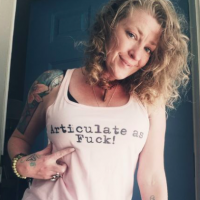In my own lineage, I am distantly related to Boudica, an Icenian queen.
She united the tribes of Britain to fight back the Romans. Her legacy is legendary, but not happy.
When you think of kings and queens, what comes to mind?
For me, it feels cold, performative, and perfectionist.
None of those qualities speak of intimacy.
Why then do some people (and some coaches) insist on referring to each other as royalty?
In Meghan Markle’s interview with Oprah, as reported by CNN, “She revealed that life within the royal family was so isolating and lonely, and that she felt so unsupported by the institution, that she contemplated suicide while pregnant with her son Archie.”
It seems that there are near inhuman standards associated with being royalty, in both past and modern times. Why, then, do we want to bring this structure, these titles, into our most intimate situations and relationships? Do we think that calling each other royalty will somehow help us escape our life’s mundanity?
Another word that comes to mind with royalty is dignity, and—as opposed to having standards and boundaries—there is something stifling about it.
I found myself wondering if my behavior, with my last lover, was dignified. Frequently freezing with this query led to withholding my care, my warmth, and occasionally caging my curiosity—my genuine desire to play.
Dignity did not afford me the space to be messy or make a mistake because, in the back corner of my mind, dignity meant perfect.
If intimacy were to have an archenemy, it would be perfection.
Perfectionism does not equate to royalty, but there is an equally unattainable and immature quality to it.
Growing up, I watched all the Disney movies. All those storylines were driven by the desire of the main character to attain the love of the prince. In those stories, being chosen by him was also tied to the female character attaining her freedom.
Snow White needed Prince Charming to wake her up. Cinderella needed her prince to rescue her from her heinous family. I mean, she had a fairy godmother and could talk to rodents, but, yeah, her greatest accomplishment was fitting into a f*cking shoe.
If we notice the role of the feminine—the would-be princesses—in these fairy tales, it is passive. She must be chosen. She has little to no agency in the process. Are we to believe that once she suddenly becomes a queen, this will change?
I tend to tap into the deeper roots and stories behind pet names and fads, and the history behind royalty is not wholesome. Historically, kingship and queenship were about the transference of land and title; it was about blending bloodlines. It was about business, not love.
There is also an innate hierarchy that is unappealing. For example, the king is usually held above the queen. In a relationship, this could create an unconscious power-over dynamic. It is, after all, inherent to the structure. Historically, there is a shortlist of queens who sat with any real power, and there are entirely too many women who lost their actual heads over a tyrant’s tantrum.
Often, when a queen has attained power, she was either dehumanized or downright demonized.
Jezebel, a Phoenician princess who became an Israeli queen, incurred the wrath of the zealot, Elijah, and was murdered for refusing to give up her chosen form of worship. We now think of a Jezebel as a loose woman because the queen refused to be executed—murdered and devoured by dogs without her jewels, fine dress, and makeup.
Even in the Arcana, the queen of the same suit as the king was often considered to represent the darker or opposing forces.
As shared on Tarot Parlor:
“Just like the Kings, they can become threatening when reversed. But even head up, they’re more complex and contrasted than the Kings. Mostly because in the Middle Ages, women were not only considered inferior to men, they were always a possible danger.”
Women as a potential danger—who also represent the darker aspects of life—is something that I resonate with. Still, it is not, in my opinion, going to lead to wholesome relating intimately.
I recognize that some people use king or queen as an expression of autonomy for claiming dominion over their life. I can respect that. But for me, it feels disingenuous and entitled.
A relationship coach I respect suggested that I did not want to claim the term queen—unlike other terms that I do resonate with: witch, priestess, or warrioress—because it represents a part of my psyche that I have not yet integrated.
From an archetypal sense, there may be some merit to this; however, I do resonate with the hierophant and priestess, which are actually higher in the arcana. In addition, I think there is some form of practicality that is appealing to me in being a witch, priestess, or even a warrioress, that I do not find in either kingship or queenship.
Bestowing titles, like king and queen upon each other—with little to no understanding of their history or even archetypal significance—feels inauthentic and grandiose.
Grandiosity and intimacy cannot share a bed.
Whenever we place someone, or they us, on a pedestal, we are inevitably going to be injured when it comes tumbling down—and it always does.
Isn’t it enough to be a good human? It is, and it is hard enough in practice.
The qualities and skills that we need to have healthy relationships have nothing to do with being royalty and everything to do with being mature, upstanding individuals.
These men and women are kind, honest, and grounded. They display seasoned empathy, have courage, are curious, and can be assertive when necessary but are also humble.
Opening our hearts to each other can feel scary and hard, especially after heartbreak. But, if we must also live up to being royalty with each other, that is another added layer of pressure.
When I think of the most flattering equivalent of a modern-day royal relationship, I think of a couple who hustles together, shares responsibilities, is honest, hard-working, reliable, and dedicated. That seems like a partnership anyone would want to get on board with.
So why does it still not appeal to me?
I don’t want a king, and I don’t want to be anyone’s queen, either. I don’t want to dress up. I want to strip down.
I don’t want to rule. I want to make love, make food, make a mess, clean it up, get feisty, feel sad, get angry and be hungry together.
I want the wild married to the mundane.
True intimacy lets us touch the sky, earth, and each other.
If we want to bare ourselves, a crown is one more thing we will need to shed.









Read 39 comments and reply